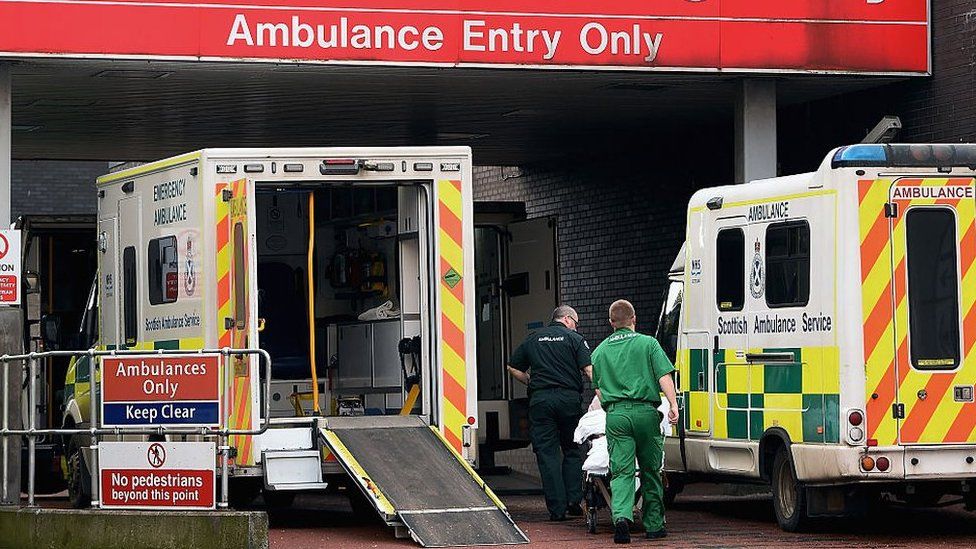ARTICLE AD BOX
 Image source, Getty Images
Image source, Getty Images
The GMB union has voted to reject an improved NHS pay deal from the Scottish government.
The union represents NHS ambulance staff, nurses, porters and radiographers.
It said two thirds of its members voted to reject the improved offer, which would have seen workers receive an average 7.5% pay uplift.
The GMB suspended a planned 26-hour ambulance strike last month and put the new offer to members in a vote.
GMB Scotland has more than 8,000 members employed across the NHS and its associated services, including 1,700 members in the Scottish Ambulance Service.
The Chartered Society of Physiotherapy (CSP) voted to accept the offer on Thursday.
Members of Unite and Unison also voted to accept the offer earlier this week.
Royal College of Nursing (RCN) members are currently voting on the offer.
GMB Scotland senior organiser for public service Keir Greenaway said the government's pay offer "doesn't go far enough" to help staff struggling with the cost of living crisis, or to improve the understaffing crisis affecting frontline services.
Mr Greenaway said the union wanted to get back round the table with Health Secretary Humza Yousaf before Christmas.
Image source, PA Media
Image caption,Health Secretary Humza Yousaf found an extra £35m for the deal
He said: "It is important the cabinet secretary takes on board the views of all NHS staff and not just some, because we are talking about frontline workers who understand first-hand the crisis across service delivery and patient care, and they have clear and credible views on how these services can be recovered in the months and years ahead.
"The fact remains that GMB members in major services and health board areas have strong legal mandates for strikes and an imposition of this offer without further discussion would be seriously detrimental to the industrial relations the Scottish government have been quick to promote.
"If the cabinet secretary wants to preserve those relations, he must meet our members urgently."
After the Chartered Society of Physiotherapy accepted the pay offer, senior negotiating officer in Scotland Claire Ronald said "there is far more to do on pay" for all workers.
She added: "However, while not everything we would have wanted, and not everything members deserve, this offer does represent a good step forward."
Mr Yousaf previously told BBC Scotland that the government's latest £515m pay proposal had been its "best and final" offer and there was "nothing left in the coffers" to improve it.
Strike action elsewhere
Nurses in England, Wales and Northern Ireland are currently striking in the largest action of its kind in NHS history.
Staff will continue to provide "life-preserving" and some urgent care but routine surgery and other planned treatment is likely to be disrupted.
Strike plans in Scotland were put on pause when the Scottish government tabled its improved pay deal.
The RCN's ballot of its members in Scotland closes on Monday, but it is not clear when the result will be announced.
The union did not make a recommendation on how members should vote, but it said the new deal "still does not meet our members' expectations" and that there would be a "clear mandate for strike action" if the offer was rejected.
It had asked for a pay deal at least 5% above inflation, which reached 10.7% in November.
The decision by GMB members to reject the current pay offer shows that the risk of industrial action in the NHS in Scotland remains real.
The union has still to decide on its next steps and hopes strike action will not be necessary.
But, aside from the question of cost, will it be possible to make a meaningful improvement to a pay offer? The offer which has now been accepted by Unison - which is the biggest union within the NHS in Scotland - and Unite?
The next big question is whether members of the Royal College of Nursing will accept the offer.
The RCN has spoken favourably about the Scottish government's efforts to engage with the NHS unions.
But that certainly does not mean that any presumptions can be made about whether RCN members will accept or reject the offer.
Any strike action requires two weeks notice which, realistically, means there is no possibility of it taking place before the new year.

 2 years ago
39
2 years ago
39








 English (US) ·
English (US) ·